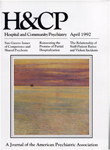Psychiatric Morbidity in Developing Countries and American Psychiatry's Role in International Health
Abstract
Economic and social change in the developing countries of Asia, Africa, Latin America, and the Pacific islands is associated with increased rates of behavior-related illnesses, including psychiatric disorders, alcoholism, and substance abuse. Between 10 and 20 percent of the presenting problems in primary care settings in those countries are psychosocial. The authors provide an overview of the epidemiology of psychiatric and psychosocial morbidity in developing countries and summarize its effect on medical care systems in those settings. They suggest that American psychiatry increase its involvement in improving mental health care in developing countries. Consultation should be directed toward priorities determined locally in those countries, including assessment of current clinical practices, applied epidemiologic research, and training of indigenous researchers.
Access content
To read the fulltext, please use one of the options below to sign in or purchase access.- Personal login
- Institutional Login
- Sign in via OpenAthens
- Register for access
-
Please login/register if you wish to pair your device and check access availability.
Not a subscriber?
PsychiatryOnline subscription options offer access to the DSM-5 library, books, journals, CME, and patient resources. This all-in-one virtual library provides psychiatrists and mental health professionals with key resources for diagnosis, treatment, research, and professional development.
Need more help? PsychiatryOnline Customer Service may be reached by emailing [email protected] or by calling 800-368-5777 (in the U.S.) or 703-907-7322 (outside the U.S.).



